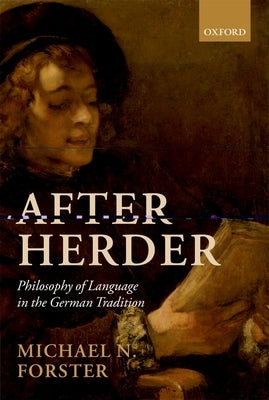1
/
of
1
Oxford University Press, USA
After Herder: Philosophy of Language in the German Tradition
After Herder: Philosophy of Language in the German Tradition
Regular price
€90,95 EUR
Regular price
Sale price
€90,95 EUR
Shipping calculated at checkout.
Quantity
Couldn't load pickup availability
Philosophy of language has for some time now been the very core of the discipline of philosophy. But where did it begin? Frege has sometimes been identified as its father, but in fact its origins lie much further back, in a tradition that arose in eighteenth-century Germany. Michael Forster explores that tradition. He also makes a case that the most important thinker within that tradition was J. G. Herder. It was Herder who established such fundamental principles in the philosophy of language as that thought essentially depends on language and that meaning consists in the usage of words. It was he who on that basis revolutionized the theory of interpretation (hermeneutics) and the theory of translation. And it was he who played the pivotal role in founding such whole new disciplines concerned with language as anthropology and linguistics. In the course of developing these historical points, this book also shows that Herder and his tradition are in many ways superior to dominant
trends in more recent philosophy of language: deeper in their principles and broader in their focus.
Author: Michael N. Forster
Publisher: Oxford University Press, USA
Published: 12/29/2012
Pages: 496
Binding Type: Paperback
Weight: 1.60lbs
Size: 9.10h x 6.10w x 1.20d
ISBN: 9780199659388
trends in more recent philosophy of language: deeper in their principles and broader in their focus.
Author: Michael N. Forster
Publisher: Oxford University Press, USA
Published: 12/29/2012
Pages: 496
Binding Type: Paperback
Weight: 1.60lbs
Size: 9.10h x 6.10w x 1.20d
ISBN: 9780199659388
About the Author
Michael Forster has taught at the University of Chicago since 1985, where he served for ten years as chairman of the Philosophy Department and is currently the Glen A. Lloyd Distinguished Service Professor in Philosophy and the College. He is the author of six books on German philosophy, including German Philosophy of Language: From Schlegel to Hegel and beyond (OUP, 2011), and many articles on German philosophy and ancient philosophy. Thematically, his main interests are philosophy of language (broadly construed) and epistemology (especially skepticism).
This title is not returnable
Share


